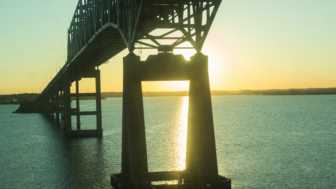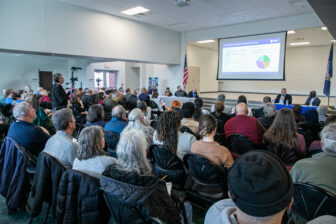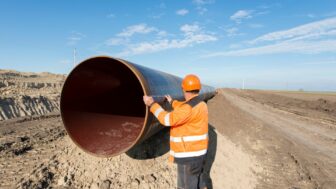Maryland Legislators Announce Steps to Combat Governor Hogan’s Efforts to Expand Fracked-Gas Pipelines and Combustion in Maryland
New documents show how Gov. Hogan is collaborating with TransCanada and others to ship large amounts of fracked gas into and across MD, violating the spirit of the state’s fracking ban.
Maryland assembly members announce possible legislative steps and other plans to stop costly leaking gas pipelines instead of Hogan’s major buildout plan for fracked-gas infrastructure across the state.
ANNAPOLIS, MD– Environmental leaders and legislators today sharply criticized Governor Larry Hogan’s multi-pronged effort to build fracked-gas pipelines in Maryland at the expense of the environment and consumers. During a telephone press call, two state senators offered an alternative pathway that involves repairing existing leaky gas pipelines in Maryland in a way that would help consumers, create jobs, and protect the climate. Environmental leaders, meanwhile, specifically reiterated their strong opposition to efforts by Hogan and TransCanada to build a controversial fracked-gas pipeline across Maryland and under the Potomac River.
Click here for a downloadable version of the “Hogan’s Fracking Hypocrisy” factsheet
Today’s press conference took place two days before hundreds of concerned activists plan to take part in the first-ever “citizen encirclement” of Gov. Hogan’s mansion, in a show of solidarity and opposition to TransCanada’s Eastern Panhandle Expansion Project, better known as the “Potomac Pipeline.” This unprecedented protest Thursday will be the culmination of nearly a year of opposition to this pipeline across Maryland, West Virginia, and Washington, D.C.
Since signing a ban on fracking in 2017, Governor Hogan has worked consistently to undermine the spirit — if not the letter — of the law. For months, his administration has been actively negotiating with controversial Canadian oil and gas companies to ship large amounts of fracked gas into and across Maryland. In December his Administration explicitly called this gas, produced in neighboring states using the dangerous fracking drilling method, a “valuable resource” with “environmental benefits” . The Administration also announced its ambitious plans to “kick-start a natural gas expansion…throughout Maryland.”
The Chesapeake Climate Action Network and the Potomac Riverkeeper Network recently uncovered how Governor Hogan has been collaborating with Canadian companies to promote fracked-gas pipelines. This includes his proposal to use settlement money from the forthcoming merger between Washington Gas and Calgary-based AltaGas to construct fracked-gas pipelines at the expense of Maryland ratepayers. Governor Hogan has proposed a virtually unprecedented settlement wherein the state of Maryland would spend $33 million in settlement money to assist gas companies in the construction of more fracked-gas pipelines all across Maryland. The settlement – which must be approved by the Maryland Public Service Commission later this year — also requires that AltaGas spend an additional $70 million (which could be charged to ratepayers) to promote pipeline construction and other fracked-gas infrastructure in the state.
During the call, Senator Richard Madaleno (D-18) and Senator Paul Pinsky (D-22) proposed taking the $100 million that Hogan wants to give to the fracked gas industry and instead investing it in workers to repair leaky pipes throughout the state, similar to legislation already passed in New Jersey and Massachusetts.
Senator Richard Madaleno (D-18) stated: “While Governor Hogan collaborates with Canadian companies to push dangerous fracked-gas pipelines where people don’t want them, Maryland’s existing pipelines are leaking climate-warming methane into our atmosphere. It’s clear we need to stop new fracked-gas infrastructure like the Potomac Pipeline from endangering the people of Maryland. We can bring jobs and environmental benefits to the state by instead focusing on rebuilding and repairing our current gas infrastructure and transitioning to renewable energy.”
Senator Paul Pinsky (D-22), who is a member of Governor Hogan’s Maryland Climate Commission stated: “Governor Hogan is putting all Marylanders at risk with his plan to aggressively expand fracked-gas infrastructure across the state. We need to work to protect the people of Maryland, not the bottom-line of Canadian gas companies.”
Documents also show that Governor Hogan collaborated with TransCanada to allow the Canadian gas company to carry out a dangerous drilling method called “Horizontal Directional Drilling” without oversight from the Maryland Department of Environment. And despite repeated pleas from groups ranging from the Potomac Riverkeeper Network to the Chesapeake Physicians for Social Responsibility, the Hogan administration refuses to follow a standard set by Virginia and other states when it comes to reviewing impacts to water quality from fracked-gas pipelines.
Mike Tidwell, Executive Director of Chesapeake Climate Action Network, who is also a member of the Maryland Climate Commission, stated: “The Governor has launched this gas expansion effort while saying he supports the Paris Climate Agreements, even as scientists confirm that fracked gas is essentially as harmful to the climate as coal. As for clean-energy substitutes to gas, the Governor vetoed a 2016 General Assembly law expanding wind and solar power and other renewable energy sources to make up 25% of the state’s grid. Governor Hogan is trying to drag us back to the dark ages on climate.”
Brent Walls, Upper Potomac Riverkeeper, stated: “It’s hypocritical for Governor Hogan to take a stand against fracking and push so hard for fracking infrastructure — and it’s absurd for him to do so with such careless disregard for the safety of his constituents. The Potomac Pipeline was just the beginning. We need a new direction for the state of Maryland, one that leads us away from outdated gas infrastructure and towards a truly sustainable energy future.”
CCAN concluded that “Hogan’s commitment to gas infrastructure is a major threat to the state’s energy policy, a potential harm to consumers, and it creates serious legal uncertainty under NAFTA.”
CONTACT:
Denise Robbins; Chesapeake Climate Action Network; denise@chesapeakeclimate.org; 608-620-8819
Brooke Harper; Chesapeake Climate Action Network; brooke@chesapeakeclimate.org; 301-992-6875






